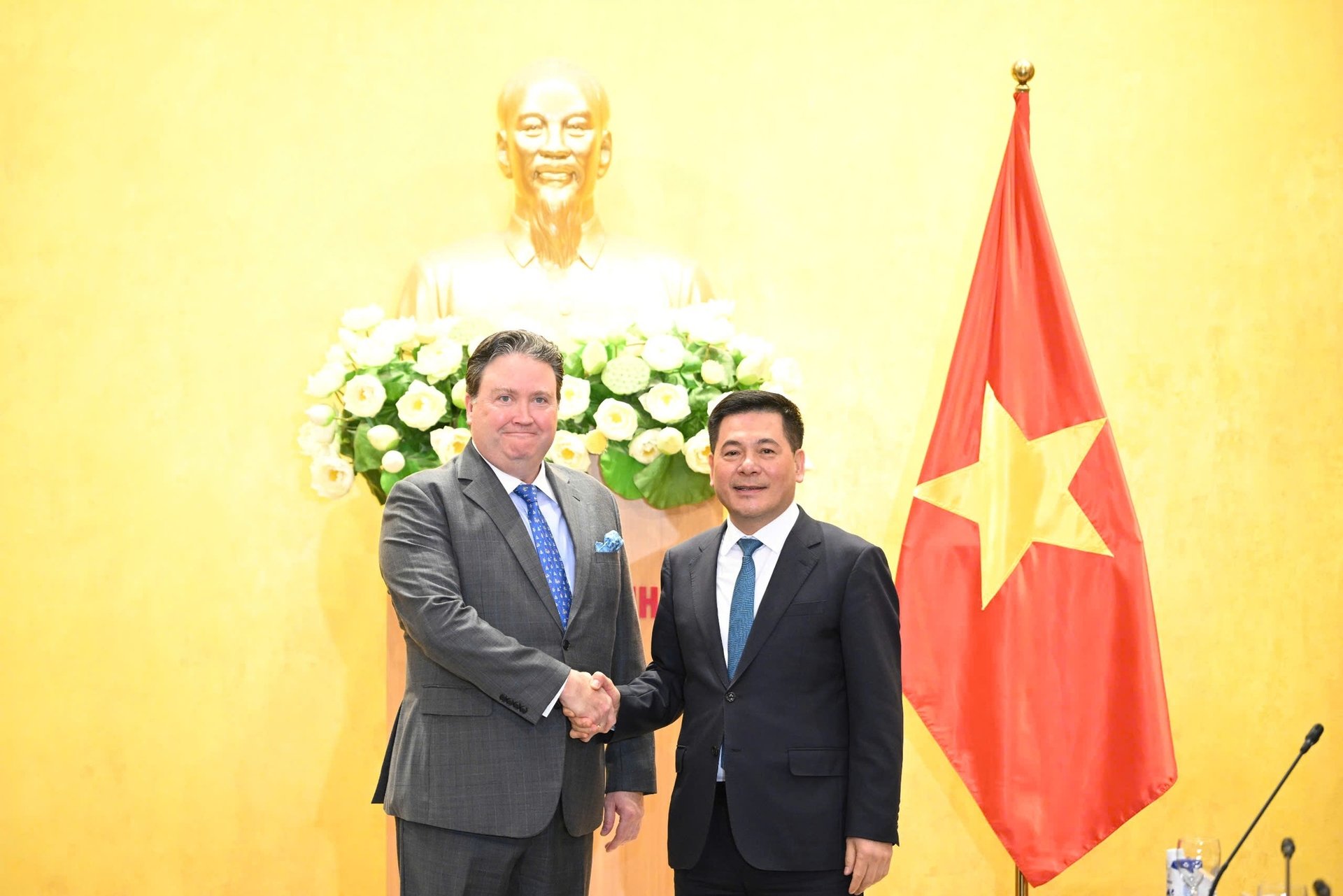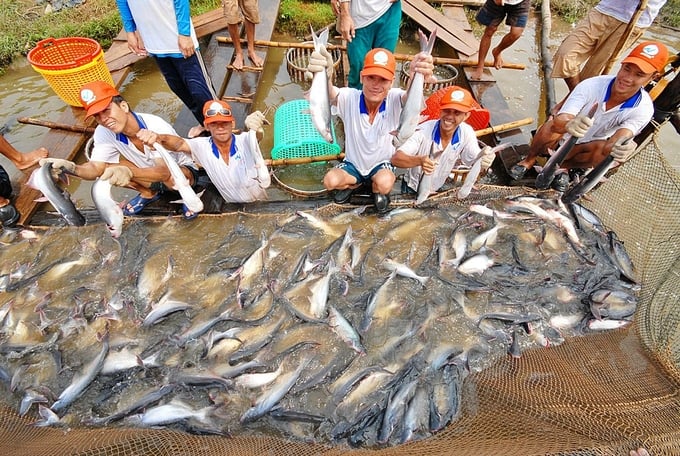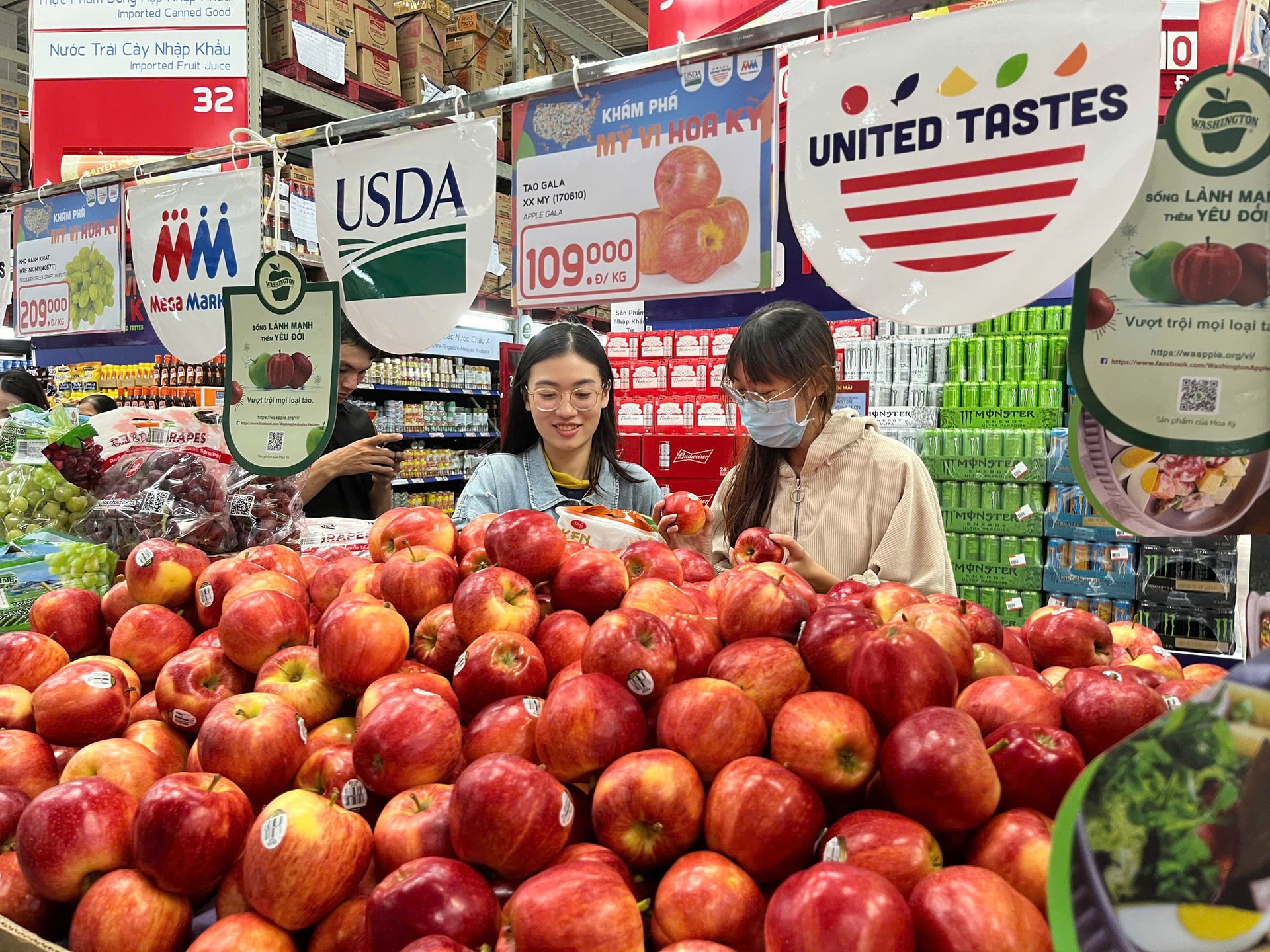November 27, 2025 | 22:28 GMT +7
November 27, 2025 | 22:28 GMT +7
Hotline: 0913.378.918
November 27, 2025 | 22:28 GMT +7
Hotline: 0913.378.918
As US President Donald Trump considers imposing higher tariffs on imported goods from several countries, local enterprises have expressed concern. The United States maintains to be Vietnam's largest importer of agricultural, forestry, and fishery products, contributing to more than 90% of the country's export turnover to North America. Among these, wood and wood products are of greatest significance, as their export turnover grew significantly in 2024, reaching USD 9.1 billion, which is equivalent to over half of the total export value of the wood sector.

Minister Nguyen Hong Dien at the reception of US Ambassador Knapper. Photo: MOIT.
According to the General Department of Customs, wood and wood product exports to the United States totaled USD 780 million in January 2025, a decrease from December 2024. However, they continue to maintain their overall position within the export chain.
According to Pham Quang Vinh, the former Vietnamese Ambassador to the United States, Vietnam's primary export products to the United States have maintained their competitiveness and development as a result of their quality and pricing. In addition, the United States' recent tariff policies do not directly target Vietnamese products.
Mr. Vinh emphasized that tariff policies are primarily concerned with ensuring transparency and fairness in trade, which includes the clear traceability of goods. He also noted that a significant number of Vietnamese goods are affordable and well-suited to the tastes of American consumers, particularly agricultural products.
Beyond timber, Vietnam has also made substantial strides in the production of pangasius fish, another significant export. Vietnamese pangasius and basa fillets exported to the United States were the subject of a protracted dispute regarding anti-dumping tariffs until the conclusion of January 2025, when Vietnam and the United States reached a critical agreement. Vinh Hoan Corporation was excluded from the list of entities that are subject to antidumping duties.
Meanwhile, the cashew industry has not shown signs of difficulty in exporting to the U.S. The Vietnam Cashew Association observed that the basic cashew supply in Vietnam is sourced from Africa and Cambodia, with no materials coming from countries subject to the International Emergency Economic Powers Act. Due to this, Vietnamese cashew exporters are still regarded as being in the "safe zone."
On the regulatory side, the Ministry of Agriculture and Rural Development (now the Ministry of Agriculture and Environment) and the U.S. Department of Agriculture (USDA) have been continuously coordinating and engaging in technical discussions to finalize legal procedures allowing the import of each country's key agricultural products. These fruits consist of passion fruit, seedless lemons, guava, and jackfruit.
This procedure is crucial, as USDA statistics indicate that agricultural products, including cotton, soybeans, and a variety of fruits, accounted for more than 25% of U.S. exports to Vietnam last year, with a total value of approximately USD 3.4 billion.

Vietnamese pangasius fish has many advantages when exporting to the United States. Photo: NNVN.
Minister of Industry and Trade Nguyen Hong Dien recently confirmed that Vietnam is prepared to expand its market and increase its imports of agricultural products from the United States during a meeting with U.S. Ambassador to Vietnam Marc Knapper. He declared that Vietnam regards the United States as a dependable and enduring supplier of raw materials, apparatus, technology, and energy. Additionally, he recommended that both parties enhance their agricultural collaboration in order to diversify their supply chains and products.
At present, the United States is Vietnam's fifth-largest import market. Important imports include USD 150 million in wheat, USD 325 million in wood products, USD 464 million in soybeans, USD 512 million in pharmaceuticals, USD 580 million in automobiles and transportation vehicles, and over USD 540 million in fruits and vegetables. Additionally, the United States imports five categories of goods, each of which has a trade value eclipsing USD 1 billion: chemicals, animal feed, plastics, raw materials, and machinery.
Vietnam continues to be one of the top 10 export markets for agricultural products from the United States in terms of agricultural commerce. Vietnamese consumers have a strong preference for American products, including beef, pork, poultry, seafood, dairy, soybeans, corn, grapes, apples, cherries, and blueberries. In particular, Vietnam imports more than 2 million cartons of apples from the United States each year.
Minister Nguyen Hong Dien emphasized that the complementary nature of the two economies is a critical factor in the development of sustainable and balanced economic and trade cooperation between Vietnam and the United States. This ensures a firm foundation for bilateral relations while simultaneously preserving national interests.
The United States has implemented a reciprocal import tariff policy and a succession of new tariff measures to adjust the trade balance and protect national economic interests, effective January 1, 2025. This measure is intended to establish import duties that are equivalent to those that other countries impose on U.S. commodities, as part of a more comprehensive strategy to reduce the trade deficit and establish a level playing field for American businesses.
Deborah Elms, an expert in U.S. trade and economic policy, has observed that President Trump is placing a particular emphasis on two critical figures: the bilateral trade deficit in commodities and exchange rate policies.
Despite the fact that Vietnam is one of the countries with a high trade surplus with the United States, Elms still considers it to be a highly potential and attractive market, a bright point in the otherwise bleak global economic landscape.

American apples are a familiar product to Vietnamese consumers. Photo: Nhu Binh/Tuoi Tre.
Vietnam's economy expanded by over 7% in 2024, superseding the objectives and projections established by the World Bank (WB) and the International Monetary Fund (IMF). Consequently, Vietnam may persist as an investment destination for prominent global corporations, despite the potential obstacles presented by the United States' new tariff policies.
The U.S. public and private sectors are prepared to enhance their collaboration with Vietnam in emerging and high-potential sectors that are in alignment with global development trends, including energy security, climate security, food security, and high technology, as Ambassador Marc Knapper stated during his meeting with Minister Nguyen Hong Dien.
In an effort to guarantee equitable trade practices for businesses in both countries, he also recognized Vietnam's efforts and encouraged further collaboration in the prevention of illegal transshipment, combating origin fraud, and avoiding trade defense circumvention.
Several measures have been suggested in response to this commitment, such as the increase in the importation of U.S.-origin products that are beneficial to Vietnam's economy. Animal feed is an example of this. The United States is presently the second-largest supplier of animal feed in Vietnam, following Argentina. It provides key raw materials, including wheat, corn, soybeans, and vegetable oils, to approximately USD 300 million annually.
Translated by Linh Linh

(VAN) On November 27, in the meeting with Minister Tran Duc Thang, Mayor Yin Yong shared Beijing’s experience to improve environment and air quality.

(VAN) After 30 years, both sides identified strategic areas of cooperation: sustainable production, increasing coffee value and training for farmers.
/2025/11/27/4910-4-164708_294.jpg)
(VAN) On the afternoon of November 27 in Beijing, Minister of Agriculture and Environment Tran Duc Thang held a working session with several major Chinese enterprises operating in the agriculture and environment sector.

(VAN) The Department of Animal Health issued a provisional guideline requesting local authorities to increase surveillance, collect samples for testing, and conduct epidemiological investigations according to the established procedure.

(VAN) The United Nations recommends that Vietnam utilize data and artificial intelligence to enhance early disaster warnings and reduce GDP losses by 3.2% in the context of climate change.

(VAN) On the morning of November 27 in Beijing, Minister Tran Duc Thang and the Deputy Commissioner General of the General Administration of Customs of China signed a protocol on fresh jackfruit exports.

(VAN) As floodwaters recede, a vast network of irrigation works across eastern Gia Lai is emerging in a state of severe disrepair, with extensive damage demanding urgent restoration ahead of the 2025-2026 winter-spring cropping season.